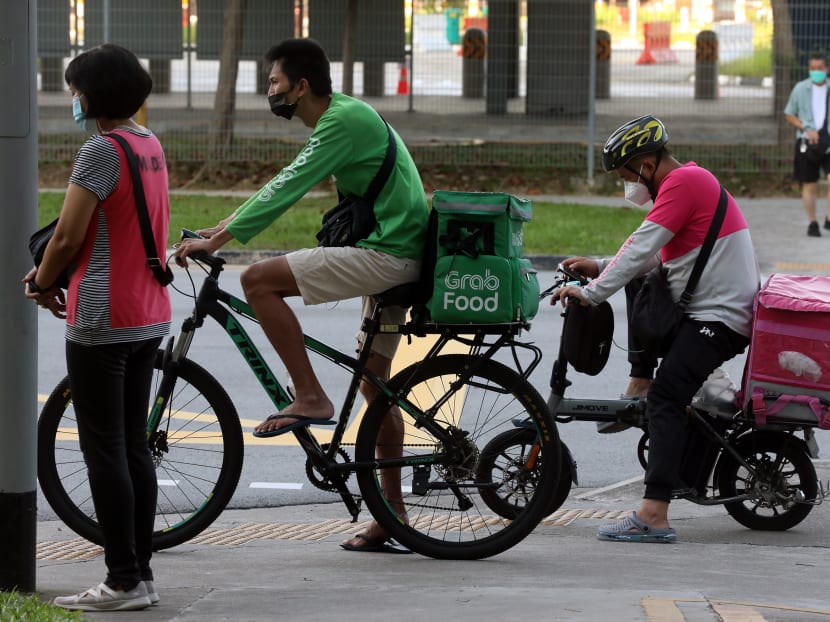Govt considering mandatory CPF contributions from platform companies for gig workers, setting up union for them
SINGAPORE — In a bid to improve protection for platform workers such as private-hire vehicle drivers and food deliverers, the Government is considering mandatory contributions from companies to these workers' Central Provision Fund (CPF) accounts.

A recent survey by the Institute of Policy Studies on platform workers found that 84 per cent were worried about whether they have enough for retirement savings.
- The Advisory Committee on Platform Workers is considering mandatory contributions from companies to the CPF accounts of workers such as private hire vehicle drivers and food deliverers
- The committee is also studying the possibility of forming a union for these workers, who want their inputs that impact their well-being accounted for in contract terms
- Senior Minister of State for Manpower Koh Poh Koon said various policy reviews are ongoing to achieve "sustainable equilibrium" between business costs and labour protections
SINGAPORE — In a bid to improve protection for platform workers such as private-hire vehicle drivers and food deliverers, the Government is considering mandatory contributions from companies to these workers' Central Provision Fund (CPF) accounts.
Another move being studied by the Advisory Committee on Platform Workers is for the formation of a union for such workers, to represent their concerns in the event of disputes.
The committee was formed in Sept 2021, to look into challenges faced by this group of self-employed persons referred to as platform workers. These are individuals who rely on online matching platforms to provide transport and delivery services.
In his speech on Friday (March 4) during a debate of the budget of the Ministry of Manpower (MOM), Dr Koh Poh Koon said that the committee, which includes representatives from tripartite partners, had conducted a public consultation exercise.
The Senior Minister of State for Manpower added: “More than half of platform workers who responded to our public consultation exercise felt that mandatory CPF contributions to their Special and Ordinary Accounts would be important for their retirement and housing needs.”
He noted that these workers were concerned about their current and future needs.
Dr Koh made reference to a recent survey conducted by the Institute of Policy Studies (IPS) on these workers, which found that 84 per cent were worried about whether they have enough for retirement savings.
He also told an anecdote of one such worker who found that irregular earnings without CPF contributions made it tough for her to save up for her long-term needs.
“Clearly, this concern warrants intervention. Failure to do so will result in unmet needs in the future and impose costs on other parts of society,” he added.
The committee is thus weighing the idea to mandate platform companies to make CPF contributions to support the retirement and housing needs of platform workers.
For now, these workers already contribute up to 10.5 per cent of their earnings to their CPF Medisave accounts for healthcare needs, he said.
Addressing concerns that this idea may result in a potential jump in business cost, Dr Koh said that a step-by-step approach is being considered to allow the various parties to adjust.
He also highlighted another finding from the public consultations, that some workers found a lack of avenue to raise their concerns. They wanted help from the unions in cases of disputes, besides having their inputs accounted for in contract terms that affect their well-being.
“Suggestions from the platforms include the establishment of industry-wide norms through tripartite discussions or with an independent body,” Dr Koh said, noting that these companies had indicated their willingness to improve the working conditions of those whom they employ.
One of the possible solutions being studied by the committee is a union to represent platform workers.
Mr Patrick Tay, a Member of Parliament for West Coast Group Representation Constituency, asked if MOM will be reviewing the Employment Act. The Act does not cover such platform workers now.
Dr Koh replied that several policy reviews are ongoing and that various recommendations are being considered “holistically”.
“The eventual recommendations will contribute towards a more sustainable equilibrium – one where the costs of labour protections are more equitably distributed and shared across each stakeholder in the platform ecosystem,” he added.








